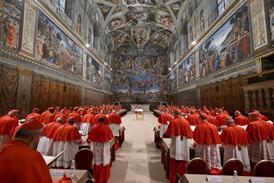“Instructive, precise but deeply depressing”

Nuclear Armageddon: How Close Are We?, BBC2
“The problem is that to a lay viewer – hi! – it is all a bit woolly. Unless you are an expert in geopolitics, there is not enough information here to give any more than a sense that things are, generally, getting worse – which most of us have likely gleaned from even the most cursory perusal of the headlines.”
Lucy Mangan, The Guardian
“Only four ‘sleeps’ until January 23, when we discover how close we are to nuclear war. Can you wait? Not that you’ll probably sleep much if you watched Jane Corbin’s instructive, precise but deeply depressing film Nuclear Armageddon: How Close Are We? I didn’t.”
Carol Midgley, The Times
“In theory, this should have been terrifying. But somehow it wasn’t, because the programme appeared to have been prompted by two things. One is the box office success of Oppenheimer. The second thing is the Doomsday Clock, which is ‘set’ every year to show how close humanity is to annihilation. Corbin went to the offices of the Bulletin of the Atomic Scientists, which sets the time, to find out more. But she failed to dispel the feeling that the clock is a bit of a gimmick, and pulling back the curtain to show us that it’s partially decided by Zoom meeting didn’t help.”
Anita Singh, The Telegraph
Cristóbal Balenciaga, Disney+
“To watch this series, and get wrapped up in the beauty, craft and dignity of Balenciaga’s life’s work feels luxurious in itself, as it’s created with a care that befits its legendary subject. He was a man who cared little for the spotlight or personal fame, so this non-salacious look at his pursuit of excellence rather than his inner turmoil is a seamless extension of his legacy.”
Leila Latif, The Guardian
“The whole thing is told through the prism of a long interview with the fashion editor of The Times (played by Gemma Whelan), in which Balenciaga looks back over his life. It’s a clunky, over-used structure at best and it brings a waft of Hallmark Channel to proceedings that sits at odds with the soignée subject matter. My suspicion is that viewers who aren’t that interested in the brand won’t be that interested in the man either.”
Benji Wilson, The Telegraph
Darby And Joan, Drama
“Both stars are competent, though hardly exerting themselves to the limit of their abilities. The chief problem is the editing: each scene stops short very obviously for an ad break every five minutes, so that the narrative feels like a string of disjointed sketches. Characters appear and vanish, storylines are cut off, and the actors never have a chance to build a rhythm. That makes it impossible for viewers to lose themselves in the mystery — the opposite of cosy crime.”
Christopher Stevens, Daily Mail





























No comments yet